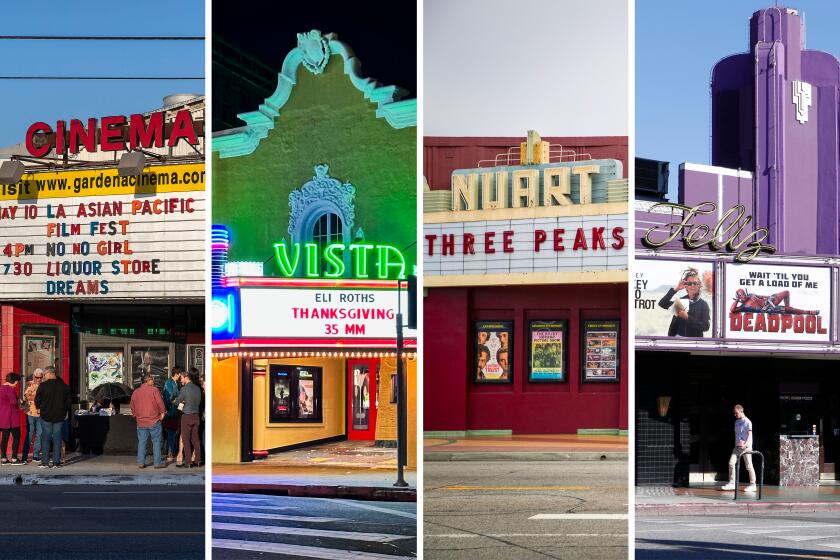Review: Civic duty leads to an inconvenient moral quagmire in Clint Eastwood’s ‘Juror #2’

- Share via
Does a small-scale human drama now qualify as an eccentric, unclassifiable studio release? Even if it’s directed by Hollywood icon and Oscar-winning filmmaker Clint Eastwood? Taking in the nonagenarian’s latest film, “Juror #2,” starring a no-slouch cast including Nicholas Hoult, J.K. Simmons and Toni Collette (but getting unceremoniously dumped into a fistful of theaters this weekend), one is struck by what’s not in it: star-mugging, superheroes (or even regular heroes), physics-defying brawls, branded messaging and CGI.
Indeed, the movie is an anomaly in our IP-driven universe. What‘s very much on offer, however, is a gently probing tale of moral seriousness about responsibility and guilt, developed from Jonathan Abrams’ patient screenplay and Eastwood’s reliably unfussy, character-driven stewardship. And no, not set in a postapocalyptic world caused by catastrophic events but in the recognizable wilds of everyday lives, and in that quotidian arena of judgment familiar to citizens everywhere: a city courthouse.
Ah, so a juicy whodunit! OK, calm down. While homicide is the charge being adjudicated in this handsome, midsize Georgia town by a gung-ho prosecutor (Collette, quite good) who also happens to be angling to win an election, the case against James (Gabriel Basso) — a tattooed bruiser accused of killing his girlfriend one rainy night on a country road — isn’t so obvious, according to his capable lawyer (Chris Messina).
The movie isn’t a conspiracy thriller. But dishonesty is on tap, and there’s slipperiness to the pool it creates. The defendant’s situation does become clearer to one person, the impaneled juror of the title, Justin (Hoult), a soft-spoken young man whose jury stint initially seems like a pesky obligation to evade while he and his wife (Zoey Deutch) nervously await their first child. Things quickly turn complicated, though, when the facts in the case privately remind Justin of a driving incident in his recent past, one with a potentially devastating impact on his own life. (I’m being vague to preserve the film’s modest revelations.)
We’ve mapped out 27 of the best movie theaters in L.A., from the TCL Chinese and the New Beverly to the Alamo Drafthouse and which AMC reigns in Burbank.
So while “Juror #2” is no white-knuckle movie, it is a slow-squeeze conscience trap, as well as a keen prism through which to stress-test our own ethics. The position Justin finds himself in — which sends him to his AA sponsor (Kiefer Sutherland) for advice, but not to his spouse — is treated as a rolling dilemma of the soul.
There are ripple effects across all the story’s players, touching on many aspects of our justice system, from substandard investigations that seed confirmation bias to trials driven by political expediency and our need for good stories over the truth. On TV, juries usually are made up of stock archetypes, but here, we get a room of believably well-intentioned, diverse citizens who may want justice but also have lives that define their outlook, ones they want to get back to. (Don’t expect the theatrical histrionics of “12 Angry Men,” either.)
Anchored by performances that refuse to tell us what to think (especially Hoult’s cagey calm), “Juror #2” skillfully depicts how, in practice, the ideal of blind justice too easily becomes the shortsighted, look-the-other-way kind. And while race and class aren’t explicitly addressed, it’s impossible not to view our protagonist’s actions through a ready-made privilege that Eastwood doesn’t disabuse us of pondering.
If “Juror #2” is this all-time-great filmmaker’s last effort, it may come across like a quiet goodbye, measured conversations replacing his oeuvre’s well-known violence and death. But in its relaxed professionalism, it’s still a worthy closing argument for what Eastwood has always cared about most — how we live as much as how we die, and in the final count, what condemns us all.
'Juror #2'
Rated: PG-13, for some violent images and strong language
Running time: 1 hour, 54 minutes
Playing: In limited release Friday
More to Read
Only good movies
Get the Indie Focus newsletter, Mark Olsen's weekly guide to the world of cinema.
You may occasionally receive promotional content from the Los Angeles Times.











